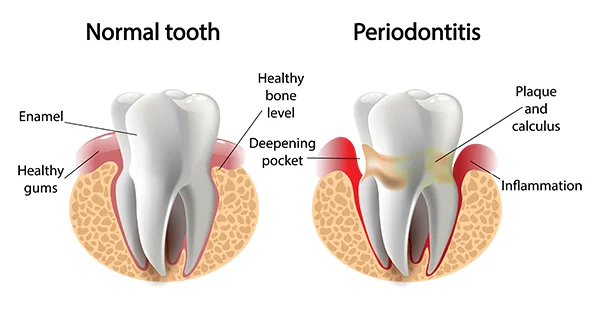Gum Disease Treatment in Scottsdale Gum disease, also called periodontal disease, is a tissue infection that can cause tooth loss or bone damage if left untreated. According to the Centers for Disease Control (CDC), around 47.2% of individuals aged 30 years and older have this condition. The problem is usually caused by poor dental hygiene, but it can be prevented by flossing and brushing at least twice daily. At our GOREgeous Smiles clinic, we advise patients to come in for regular dental checkups to avoid the spread of the disease. Gum disease, also called periodontal disease, is a tissue infection that can cause tooth loss or bone damage if left untreated. According to the Centers for Disease Control (CDC), around 47.2% of individuals aged 30 years and older have this condition. The problem is usually caused by poor dental hygiene, but it can be prevented by flossing and brushing at least twice daily. At our GOREgeous Smiles clinic, we advise patients to come in for regular dental checkups to avoid the spread of the disease. Reduce the Risk of Developing Gum DiseaseHere are other things that we might tell you to do. Quit SmokingSmoking is among the many reasons that cause gum disease. This is why we encourage our patients to stop smoking. Smoking weakens the immune system, and when that happens, your body loses the ability to fight bacteria that cause periodontal disease. Choose the Right ToothpasteFluoride toothpaste is the best as it eliminates mouth bacteria and strengthens and keeps your teeth healthy. This will help reduce the risk of getting gum infection. Therapeutic Mouthwash Also HelpsTherapeutic mouthwash can help eliminate harmful bacteria that cause gum disease. It cleans all parts of your mouth that your toothbrush cannot reach. This greatly helps to minimize signs of gingivitis that can potentially lead to serious gum problems. Factors that May Cause Gum DiseaseWhile poor dental hygiene is the most common cause of gum disease, other factors can also contribute to gingivitis and periodontal disease. During puberty, pregnancy, and menopause, hormonal changes can make the gums swell and become sensitive. Also, illnesses such as cancer and HIV can affect the gums. In other cases, you may develop gum disease if it is in your family history. Common Symptoms of Gum DiseaseKnowing the signs and symptoms of gum disease is crucial as it allows you to know when to see a periodontist. Red and swollen gums are one of the first things you might notice when you have this disease. Sometimes it can also be very painful to chew food or drink anything hot. Apart from that, you will feel your gums are tender and can quickly begin to bleed if put through any friction. Gum disease can also create bad breath that will not easily disappear, no matter how much you brush your teeth. DiagnosisA periodontist begins by taking a few readings to determine if you have periodontal disease. They will examine your gums to detect any signs of bleeding or inflammation. A tiny device commonly known as a probe will also be used to check any pockets around your gums. A healthy mouth typically has pockets that are around 1 to 3 millimeters. The good news is that this test is not painful. Apart from that, an X-ray will be taken to see hidden gum problems. Your dentist may also want to know more about your dental medical history to determine the cause of your gum disease and find you the best treatment option. Treatment Options for Periodontal DiseaseWhether your gum problem is caused by genes or poor oral health, you should come to visit us at GOREgeous Smiles to get the best treatment and care for your gums. You can also call us through 480-585-6225 for more tips on how to maintain and care for your gums. |